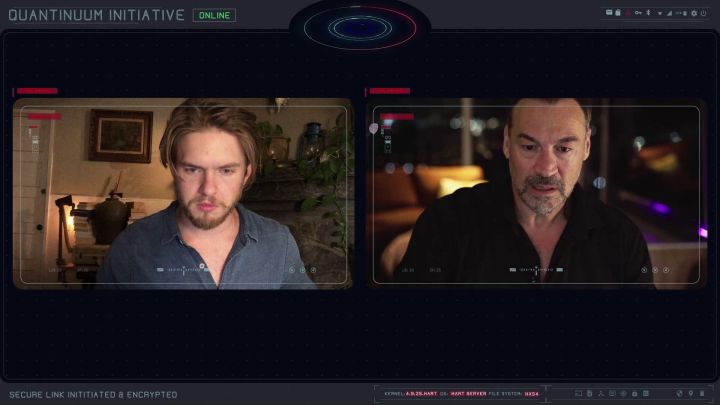For a project virtually constructed and directed over Zoom, there isn’t a more appropriate name for the film Zero Contact. Produced in 17 different countries during the global pandemic, Zero Contact is a thriller that focuses on the dangers of high-tech in a virtual world. Anthony Hopkins (The Silence of the Lambs) stars as Finley Hart, an unconventional genius behind a global data-mining program. When Hart suddenly dies, five strangers are digitally called upon to continue Hart’s work, which is an initiative that involves time travel. However, outside forces begin to stalk and harm each of the five people, forcing the group to decide whether to finish the mission at the risk of their own lives.
Directed by Rick Dugdale, Zero Contact is billed as the “world’s first feature film NFT event.” The film can be purchased as an NFT through Vuele, a platform that specializes in collecting and trading feature film NFTs and their subsequent content. In a conversation with Digital Trends, Dugdale spoke about the challenges of directing over Zoom, how he convinced Anthony Hopkins to join the cast, shooting part of the sequel in Antarctica, and what the future holds for Vuele and feature film NFTs.

Note: This interview has been edited for length and clarity.
Digital Trends: So the pandemic began in 2020. Where and when did you get the idea to make this movie?
Rick Dugdale: I think we’re a week into the pandemic and we had nothing to do. So we had this international think tank, and we said to our colleagues around the world, “Well, how do you make a film if you can’t be in the same room together?” And so we started to kind of workshop this idea with a brilliant writer, Cam Cannon, who works with me, and we came up with this idea that he ran with. Ten days later, we had a script. [Cam is] a very fast writer so we weren’t surprised necessarily it was that fast. But you read it and everyone that read it said, “Well, wait a second. This actually works.” And we started to workshop a little bit, and next thing you know, we started putting the cast together. From there, it just became convincing people that this wasn’t going to be a waste of their time. And we went for it.
Speaking of convincing people, how did you convince Anthony Hopkins to become involved with this project?
It led with, “Look. You know no one’s really making movies right now.” And Anthony’s like, “I’m not doing a film. I’m not getting off my couch until there’s a vaccine.” I said, “Well, maybe you don’t have to go too far.” I had fortunately worked with him [before], so I knew what it was going to take for his team to understand that this actually is a real film. So we presented them a very kind of beat-by-beat schedule — getting equipment into the house, how we shoot it. He said, “Look. I’ve made a lot of films in my career, but I certainly haven’t made a film like this. so let’s go for it.” But having that relationship with him, I think, gave him confidence that we weren’t going to waste his time.
You’ve been producing films for two decades, but Zero Contact is the first film that you directed. What about this film made you decide to finally direct?
First of all, when it came together, Cam and I were working on this idea. The original idea was what if five world leaders were assassinated around the world at the same time by the same person. That was kind of the origin story. Which yes, someone can go run with that idea [laughing]. But that was the origin of it. As he was writing the screenplay, I started to tell Cam, “Hey, let’s put [in] a Japanese character because TJ [Kayama] is a friend of ours. He can shoot that part. Let’s get Veronica Ferres. She can play that part. She’s a friend in Germany.”
All of a sudden, we get a script and a production plan. My colleague, Peter Toumasis, says, “All right, so who’s going to direct?” And I said, “Well, I guess that’s me.” We’re going to run it from a war room. Being part of conceptualizing it was a story that interests me. Cam and I put it together using, let’s say, the ancient astronaut theory and that’s where it can go. So it’s something that, personally, I’m interested in. It always fascinated me, so it made sense to say, “All right, this is it.”

Logistically, you’re telling actors that they now have to pay attention to shot angles, lighting, and sound. Plus, you’re directing it all on Zoom. How did that process go? What challenges did you face?
They [the actors] have a lot more respect for producers now, which is great. We used Zoom as a device to stand on set. It was not a Zoom movie, right? There’s real equipment. So if the Wi-Fi signal went down, we can’t see or hear the performance, but they probably recorded it in the camera. So we had to say, “Hey, can we get some playback on camera? And by the way, you need to do the playback yourself and tell us if you like the shot.” We had a great AD [assistant director], and we treated the set like a real set because, from a psychology standpoint, you needed comfort. I think, personally, I needed everyone to have the confidence that this was worthwhile.
So we had an AD. We had a production designer on set. We had an editor on set, which is not totally common for every scene you shoot. But the AD, Ardy Carlson, would run it and say, “OK, guys, you ready? Pictures up. OK, so let’s roll sound. Oh, wait, let’s close the curtain. Got a silhouette that’s not going to work.” Got the DP [director of photography], Ed Lukas, calling shots for framing, which means the actors change the frame themselves and all kinds of stuff. But then it’s like let’s roll sound. The actor would turn and push the button on the camera. [He would say] “You good, Alex? All right, let’s do this.” Then, we would read lines opposite him and he’d perform opposite myself or the AD. The more you treated it like a real set, then [you get] the real outcome, the real performance.
A unique aspect of the film is the NFT side of this. Zero Contact is a feature-length NFT through Vuele. Can you explain what Vuele is, and what it means when someone purchases it through Vuele?
Vuele is the world’s first-ever NFT film distribution company doing film distribution using NFTs, which is a lot different than a traditional distribution strategy. This is more of a fan engagement, collectible, resalable tool using NFTs. With Vuele, we’d also be doing collectibles tied to the films that it releases. But this is a unique way for us to engage the fan base that is not the same consumer, right? To be able to partner with Lionsgate just sends the message to Hollywood that this is something new. This is a revenue stream that did not exist in Hollywood.
So it’s two totally different audiences right now. People who have the NFT will have all kinds of components that are added and airdropped to it. It’s like getting the T-shirt from the Metallica concert. There’s something to go home with, a utility. That’s different. I think the traditional distribution strategies that are happening now are not filled with utility. When you buy the Blu-ray box set, you still get to own it and put it on your shelf. It’s just a different consumer base. The future is going to obviously, we believe, include an NFT component to it, just like streaming became a popular thing 10 years ago. It’s no different than that.

Now for someone who may not even own NFT or even understand them all, what will the audience receive get if they purchase Zero Contact through Vuele?
I mean it’s exclusive access. It came out previously, and there are different versions of the film that were accessible. Speaking for Vuele, every film will have different components like this: Exclusive early access and long lists of utilities. In the first 11 versions of the film, for example, if you bought that on Vuele, inside your NFT, you got to shoot yourself into the film. Once we go with a studio like Lionsgate, you couldn’t make 2 million copies of the film from the people that bought the 2 million [copies], so it would be impossible. But in this particular case, in Zero Contact, you get to play a character in the film. Your version of the film is you opposite Anthony Hopkins. That’s unheard of in Hollywood. That is one of the many utility components.
With the idea of putting someone in a film, everyone can be an actor now.
Even if it’s a bad performance, it’s still a cool NFT to have [laughes]. I think that’s it. The sky’s the limit with inclusions and utility components that you can have as an NFT. Again, different audience, but a different way to release a movie.
Zero Contact is getting two sequels, and you just shot part of the first sequel in Antarctica. How did that come about? Why shoot in Antarctica?
I’ve long had a passion to do that. We had been working on a show at one point about Antarctica because we knew a lot about it. But I also realized that once you go there, everything we’ve been making for years, set in Antarctica that was shot in Alaska and Montana, is wrong. There are no trees there. There are no helicopters flying around Antarctica. In the origin story of Zero Contact, although driven by a tech titan, hard enterprises, and time travel, what you will start to realize is how did he develop the time travel technology. This is like quantum physics and the Earth’s electrical grid lines. This is where we are going with this universe.
It starts with the electrical grid points that would include the North and South Poles. So could we shoot that in Montana? Sure. But as a producer, if you put the work in, you realize that it’s not that much more expensive to go to these places than it is cheating it in the backlot in L.A. or in some studio in Canada. So that’s kind of how we looked at it. Take the audience to these places that they have never been before for the “wow factor.” Then on top of that, the emotional impact of the talent performing there was incredible. We would have shot it greenscreen, the stuff we did in Antarctica, and you wouldn’t have got that same performance.
How will you one up Antarctica for the third film? Is space a possibility? A volcano?
I don’t want to give it away, but we’ll be talking again about that one. We are doing some pretty special things, and continuing to innovate. That’s really what this is about. Let’s make life interesting. And so in these films, the storyline is part Indiana Jones, part Inception/Cloud Atlas. Being in a time travel type of genre, there are endless possibilities of where to take that storyline. Let’s just say if we could capture a sequence on Mars, that would be pretty cool. So we’ll revisit that.
Zero Contact is in theaters, on digital, and on demand starting May 27, 2022.



